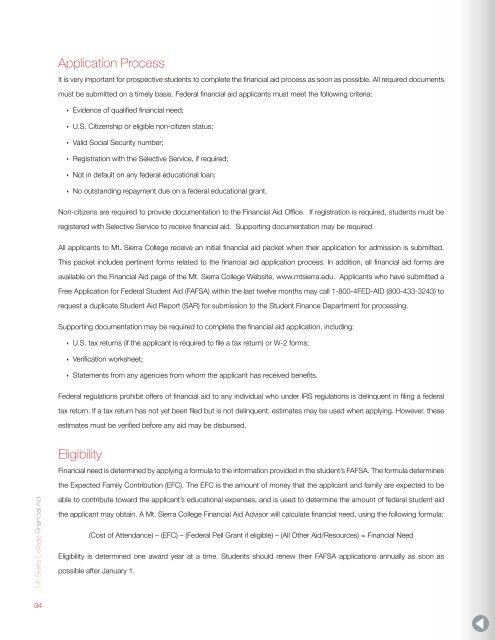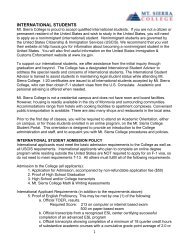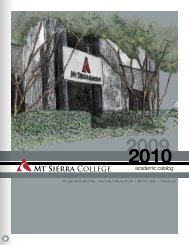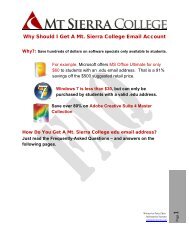academic catalog - Mt. Sierra College
academic catalog - Mt. Sierra College
academic catalog - Mt. Sierra College
Create successful ePaper yourself
Turn your PDF publications into a flip-book with our unique Google optimized e-Paper software.
<strong>Mt</strong>. <strong>Sierra</strong> <strong>College</strong> Financial Aid<br />
34<br />
Application Process<br />
It is very important for prospective students to complete the financial aid process as soon as possible. All required documents<br />
must be submitted on a timely basis. Federal financial aid applicants must meet the following criteria:<br />
Ì Evidence of qualified financial need;<br />
Ì U.S. Citizenship or eligible non-citizen status;<br />
Ì Valid Social Security number;<br />
Ì Registration with the Selective Service, if required;<br />
Ì Not in default on any federal educational loan;<br />
Ì No outstanding repayment due on a federal educational grant.<br />
Non-citizens are required to provide documentation to the Financial Aid Office. If registration is required, students must be<br />
registered with Selective Service to receive financial aid. Supporting documentation may be required.<br />
All applicants to <strong>Mt</strong>. <strong>Sierra</strong> <strong>College</strong> receive an initial financial aid packet when their application for admission is submitted.<br />
This packet includes pertinent forms related to the financial aid application process. In addition, all financial aid forms are<br />
available on the Financial Aid page of the <strong>Mt</strong>. <strong>Sierra</strong> <strong>College</strong> Website, www.mtsierra.edu. Applicants who have submitted a<br />
Free Application for Federal Student Aid (FAFSA) within the last twelve months may call 1-800-4FED-AID (800-433-3243) to<br />
request a duplicate Student Aid Report (SAR) for submission to the Student Finance Department for processing.<br />
Supporting documentation may be required to complete the financial aid application, including:<br />
Ì U.S. tax returns (if the applicant is required to file a tax return) or W-2 forms;<br />
Ì Verification worksheet;<br />
Ì Statements from any agencies from whom the applicant has received benefits.<br />
Federal regulations prohibit offers of financial aid to any individual who under IRS regulations is delinquent in filing a federal<br />
tax return. If a tax return has not yet been filed but is not delinquent, estimates may be used when applying. However, these<br />
estimates must be verified before any aid may be disbursed.<br />
Eligibility<br />
Financial need is determined by applying a formula to the information provided in the student’s FAFSA. The formula determines<br />
the Expected Family Contribution (EFC). The EFC is the amount of money that the applicant and family are expected to be<br />
able to contribute toward the applicant’s educational expenses, and is used to determine the amount of federal student aid<br />
the applicant may obtain. A <strong>Mt</strong>. <strong>Sierra</strong> <strong>College</strong> Financial Aid Advisor will calculate financial need, using the following formula:<br />
(Cost of Attendance) – (EFC) – (Federal Pell Grant if eligible) – (All Other Aid/Resources) = Financial Need<br />
Eligibility is determined one award year at a time. Students should renew their FAFSA applications annually as soon as<br />
possible after January 1.<br />
Financial Aid Probation<br />
Regulations mandate that all students must meet certain <strong>academic</strong> standards to maintain eligibility for federal and state<br />
financial aid, including loans and grants. There are three standards of progress that must be met: 1) qualitative progress<br />
(grade point average), 2) quantitative progress (credit hours earned), and 3) maximum time in program. All periods of<br />
attendance are reviewed, including periods in which the student did not received financial aid. The full terms of the<br />
Satisfactory Academic Progress policy and the <strong>academic</strong> impact of the failure to maintain these standards are explained on<br />
page 46. The following addresses the impact upon financial aid eligibility.<br />
1. Qualitative: Students must maintain a minimum cumulative grade point average of 2.00 throughout the program.<br />
Cumulative grade point average is reviewed quarterly. Students whose cumulative grade point average falls below<br />
2.0 will be placed on <strong>academic</strong> (GPA) probation as defined under Academic Probation Policy.<br />
Financial aid eligibility levels while on GPA Probation:<br />
GPA 1: First Time Probation Eligible<br />
GPA 2: Continued Probation Eligible<br />
GPA 3: Second Continued Probation Not Eligible<br />
Students will regain eligibility when removed from GPA 3 probation by raising their cumulative grade point average<br />
to at least 2.0.<br />
2. Quantitative: Students must earn sufficient credit hours to maintain satisfactory <strong>academic</strong> progress. Students will<br />
be reviewed at the end of their first <strong>academic</strong> year (equal to three quarters) and quarterly thereafter. To demonstrate<br />
satisfactory progress, students must maintain a completion rate of at least 70%. The completion rate is calculated<br />
by dividing total credit hours earned by total credit hours attempted.<br />
A student whose completion rate falls below 70% will be placed on SAP Probation as defined in under Academic<br />
Probation Policy.<br />
Financial aid eligibility levels while on SAP Probation:<br />
SAP 1: Progress Probation Eligible<br />
SAP 2: Continued Progress Probation Not Eligible<br />
Students will regain eligibility when removed from SAP 2 probation by raising their completion rate to at least 70%.<br />
3. Maximum Time in Program: Credit hours attempted may not exceed 150% of the credit hours required to<br />
complete the program. Students are not eligible for federal and state financial aid for credit hours in excess of this<br />
amount. For example, 198 credit hours are required to earn a degree in Game Arts & Design. Game Arts students<br />
may receive aid for 1.5 times 198 credit hours, equal to 297 credit hours. See Satisfactory Academic Progress for a<br />
listing of credits allowed for all programs.<br />
Appeal Process and Progress Exceptions<br />
Students who have failed to maintain satisfactory <strong>academic</strong> progress due to significant cause may appeal for a progress<br />
exception. Appeals to have Financial Aid reinstated must be submitted in writing to the Director of Student Finance. The<br />
appeal must be based upon mitigating circumstances such as serious illness, a death in the family, significant work schedule<br />
issues, etc. Students are required to provide verifiable documentation such as a doctor’s note to be considered for a progress<br />
exception.<br />
<strong>Mt</strong>. <strong>Sierra</strong> <strong>College</strong> Financial Aid<br />
35







